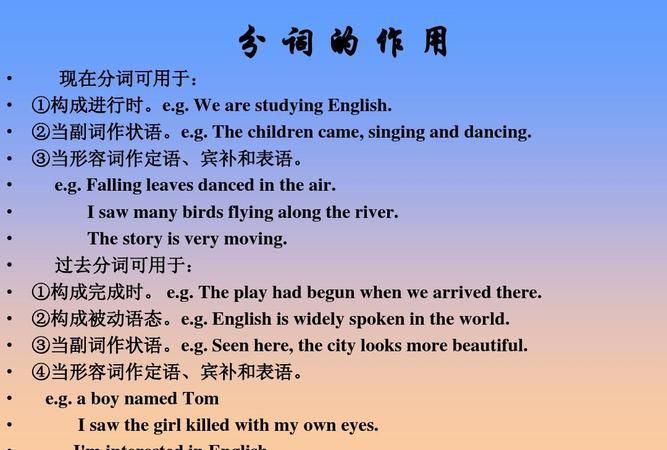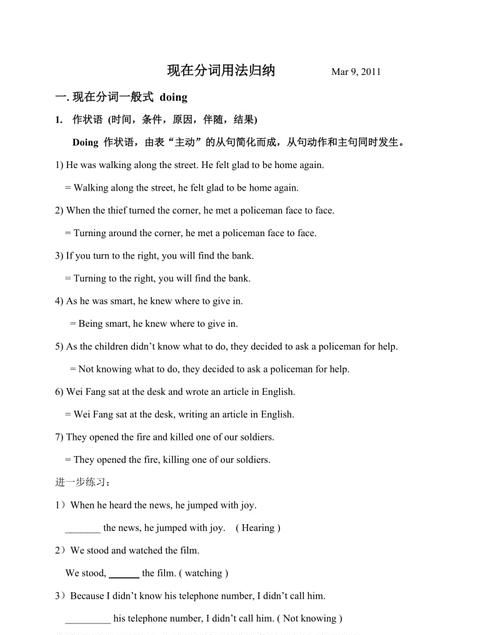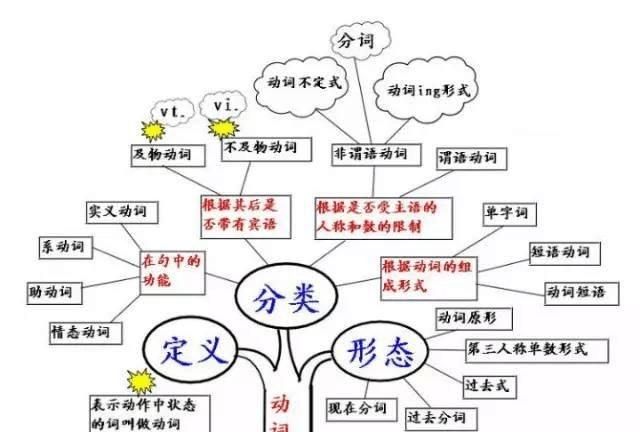本文目录
高中英语易错知识要点归纳总结
高中英语易错知识总结
1.同位语从句:同位语从句在句中作A同位语,对被修饰名词的内容予以解释说明。同位语的特点是:抽象名词在前,表达具体内容的从句在后。
常见的名词包括: assumption假定/belief看法/ conclusion结论/ doubt怀疑等。 例句:The suggestion that we should develop the natural resources in the region has been discussed. 关于我们应该开发本地区资源的建议已经讨论过了。
2.现在完成时:表示过去延续到现在的动作或状态。具体来说,这种用法是表示开始于过去的动作一直持续到现在,而且还可能继续持续下去。谓语动词一般为延续性动词。
例句:An old woman walked out into the middle of the street. The policeman yelled to her, “Don’t you know what it means when I hold up my hand?” The lady said, “Sure I do. I have been a schoolteacher for 28 years now.” 一个老妇人走到了马路中央,这时,一位交警朝着她嚷道:“我都把手举起来了,你难道还不知道什么意思吗?”老太太说:“我当然知道,我都做了28 年的老师了。”
3. 时间状从:not„until„ 用法。例句:The students didn’t stop talking until the teacher came in.
4. it做形式主语,句子做逻辑主语:如果主语太长,常用代词 it 作形式主语,将真正的主语从句置于句尾,以保持句式的平衡。
例句:It makes no difference what you read or study if you can’t remember it. 如果你记不住,那么你读什么或者学什么都不重要了。
5. 现在分词短语作状语:
(1)现在分词作时间状语。例句:There are several things to consider when buying fresh foods. 当购买新鲜食品时,有几个事情要考虑。
(2)现在分词作条件状语。例句:Working hard, you will succeed. 如果努力工作,你将会成功。
(3)现在分词作伴随状语。例句:All night long he lay awake, thinking of the problem. 他整夜躺在床上睡不着,思考着那个问题。
(4)现在分词作方式状语。例句:Please answer the question using another way. 请用另一种方法回答问题。
(5)现在分词作原因状语。例句:Not knowing her address, I can’t write to her.由于不知道她的地址,我没法给她写信。
(6)现在分词作结果状语。
例句:Possessing a car gives a much greater degree of mobility, enabling the driver to move around freely. 拥有汽车使机动程度更高,使司机能自由自在地往来各地。
(7)现在分词作让步状语。
例句:Although working from morning till night his father didn’t get enough food.虽然他父亲从早到晚拼命干,但是还是挣不够吃的。
高中英语易错知识
一、现在进行时
1.概念:表示现阶段或说话时正在进行的动作及行为。
2.时间状语:Now, at this time, days, etc. look. listen
3.基本结构:主语+be +doing +其它
4.否定形式:主语+be +not +doing+其它
5.一般疑问句:把be动词放于句首。
6.例句:How are you feeling today?你今天感觉如何?
He is doing well in his lessons.在课上他表现得很好。
二、 过去进行时
1.概念:表示过去某段时间或某一时刻正在发生或进行的行为或动作。
2.时间状语:at this time yesterday, at that time或以when引导的谓语动词是一般过去时的.时间状语等。
3.基本结构 主语+was/were +doing +其它
4.否定形式:主语+was/were + not +doing+其它
5.一般疑问句:把was或were放于句首。(第一个字母大写)
6.例句:At that time she was working in a PLA unit.那段时间她在人民解放军部队工作。
When he came in, I was reading a newspaper.他进来时,我正在读报纸。
高中英语语法知识
一般过去时
1.一般过去时表示过去某个时间发生的动作或存在的状态,常和表示过去的时间状语连用。一般过去时也表示过去经常或反复发生的动作感谢。
2.Be动词在一般过去时中的变化:
⑴am 和is在一般过去时中变为was。(was not=wasn’t)
⑵are在一般过去时中变为were。(were not=weren‘t)
⑶带有was或were的句子,其否定、疑问的变化和is, am, are一样,即否定句在was或were后加not,一般疑问句把was或were调到句首。
3.句中没有be动词的一般过去时的句子
否定句:didn’t +动词原形,如:Jim didn‘t go home yesterday。
一般疑问句:在句首加did,句子中的动词过去式变回原形。如:Did Jim go home yesterday? 特殊疑问句:⑴疑问词+did+主语+动词原形?如: What did Jim do yesterday?
⑵疑问词当主语时:疑问词+动词过去式?如:Who went to home yesterday?
动词过去式变化规则:
1.一般在动词末尾加-ed,如:pull-pulled, cook-cooked
2.结尾是e加d,如:taste-tasted
3.末尾只有一个元音字母和一个辅音字母的重读闭音节,应双写末尾的辅音字母,再加-ed,如:stop-stopped
4.以‚辅音字母+y‛结尾的,变y为i, 再加-ed,如:study-studied

分词作定语的用法讲解归纳
一、英语分词在句子中作定语时,单个的分词通常放在被修饰的名词之前,分词短语一般置于所修饰的中心词后面。现在分词修饰的是发出该动作的`名词(即与名词有主谓关系),分词短语作定语时放在后,并且名词与现在分词之间存有逻辑上的主谓关系。这是区分现在分词作定语和动名词作定语的判断方法之一。例如:
1.a running boy
2.the girl standing there
并且一般都可以转化为一个进行时的定语从句。
1.a boy who is running
2.a girl who is standing there
二、在现在分词作定语时,需要注意以下几点
1、分词的完成时不可作定语
2、在message letter sign news notice等词后要用现在分词作定语,不用过去分词,这是考试的易错点。
3、某些现在分词作定语时,已不再表示动作,已经从分词变为了形容词词性,如interesting story, an exciting match。这些也可以属于现在分词作定语,但是不能转化为相应的定语从句,但是可以有三级变化(原级 比较级 最高级)和被某些副词如very修饰。
三、作定语的过去分词相当于形容词,其逻辑主语就是它所修饰的名词.及物动词的过去分词作定语,既表被动又表完成;不及物动词的过去分词作定语,只表完成。过去分词修饰承受该动作的名词(即与名词是动宾关系)。
1、过去分词用作定语,如果是单个的,常置于其所修饰的名词之前。
We must adapt our thinking to the changed conditions.
我们必须使我们的思想适应改变了的情况。
2、过去分词短语用作定语时,一般置于其所修饰的名词之后,其意义相当于一个定语从句,但较从句简洁,多用于书面语中。
The concert given by their friends was a success.
他们朋友举行的音乐会大为成功。
3、过去分词短语有时也可用作非限制性定语,前后常有逗号。
The meeting,attended by over five thousand people,welcomed the great hero.
他们举行了欢迎英雄的大会,到会的有五千多人。
4、用来修饰人的过去分词有时可以转移到修饰非人的事物,这种过去分词在形式上虽不直接修饰人,但它所修饰的事物仍与人直接有关。
The boy looked up with a pleased satisfied expression.
男孩带着满意的表情举目而视。
四、1.We will go on with our experiment as soon as we get the added fund.
2.This is really an exhausting day to all of us!
3.We can see the part of the moon lighted by sunlight.
4.After a night spent in excitement and sleeplessness, I forced myself to take a long walk along the beach the next day.
5.More and more developing countries established strategic partnership with developed countries

英语里面的现在分词是什么意思
现在分词
现在分词(present participle)(又称-ing形式,现在进行式) ,是分词的一种,分词又分为现在分词和过去分词,它们都是非限定动词,现在分词在句子里面不能单独充当谓语,但能充当其它的一些成分(定语,表语,补语,状语),并且它们具有动词的性质,所以又是类动词的一种。一般式:doing; 一般被动式:being done; 完成式:having done; 完成被动式:having been done。 所有否定式都是在-ing前面加not ,包括独立主格形式。
现在分词在英语这一科目中,也是比较重要的一部分,具有双重性,一面具有动词的特征,可以有自己的宾语和状语;另一面具有形容词和副词的特征,可以充当表语,定语,状语,补足语,可以表示主动或正在进行的动作,是非谓语动词的一种。
中文名
现在分词
外文名
present participle
别称
-ing形式 现在进行时
类别
分词的一种
构成形式
情况 方法 事例
1
一般情况
直接加-ing
do→doing
sing→singing
study→studying
comfort→comforting
2
以不发音的e、ue结尾的动词
去e, 加-ing
dance→dancing
like→liking
write→writing
make→making
take→taking
3
以重读闭音节结尾的动词,并且末尾只有一个辅音字母,最后一个字母不是x的动词
双写最后一个字母,再加ing
run→running
cut→cutting
swim→swimming
否定结构
现在分词的否定式由“not+现在分词”构成。如:
Not knowing where to go, she went to the police for help.
她不知道该往哪儿走,就去请警察帮助。(现在分词一般式的否定结构)
Not seeing John, I asked where he was.
我看不见约翰,于是问他在何处。(现在分词一般式的否定结构)
Not being seen by anyone, the thief escaped.
那个贼趁无人看见时逃跑了。(现在分词被动式的否定结构)
Not having done it right,I tried again.
我由于没有做对,所以又试了试。(现在分词完成式的否定结构)
一般式
(1) 现在分词的一般式通常表示其动作与谓语动词的动作同时发生。如:
She sat there reading a novel.
她坐在那里看小说。
A little child learning to walk often falls.
学走路的小孩常常跌跤。
(2) 现在分词的一般式所表示的动作有时在谓语动词的动作之前发生。如:
Going into the room,he shut the door.
走进房间,他就关上了门。
完成式
现在分词的完成式表示其动作在谓语动词的动作之前完成。
Having finished her homework, the little girl began to watch TV.
做完作业后,这个小女孩开始看电视。
Having lived in Beijing for many years, Carter knew the city well.
因为在北京住了多年,卡特对这个城市很熟悉。
被动式
现在分词的被动式表示其逻辑主语为现在分词动作的承受者。
1)现在分词的一般被动式。如:
The building being built is our library.
正在建的那栋楼是我们的图书馆。
The question being discussed is of great importance.
正在讨论的问题非常重要。
2)现在分词的完成被动式。如:
Having been warned by the teacher, the students didn’t make such mistakes.
老师警告他们之后,学生们不再犯这样的错误了。
Having been told many times , he still did not know how to do it.
(人家)已经告诉他多少次了,他还是不知道怎么做。
垂悬结构
1)现在分词作状语时,其逻辑主语应该与句子的主语一致,但有时现在分词的主语与其所在句中的主语并不一致,这种现在分词即所谓的垂悬现在分词。垂悬现在分词容易使句意模糊,甚至造成歧义,因而通常被认为是不合规范或错误的用法。
Searching along the deck,it had taken him some time to find a doctor.
他沿着甲板找了好久才找到一名医生。(searching的逻辑主语是句中的him)
Walking or sleeping,this subject was always in my mind.
不论是走路或睡觉,我总是在想着这个问题。
(walking or sleeping的逻辑主语是句中的my)
Traveling is interesting but tiring.旅行是有趣的,但是使人疲劳。
The pupils will get confused if they are made to learn too much.如果让学生学得太多,他们会感到糊涂的。
The argument is very convincing.他的论点很令人信服。
They were very excited at the news.听到这个消息,他们非常激动。
2)现在分词作表语时,相当于形容词,不可与构成进行时态和被动语态中的分词混淆起来。它们的形式一样但可以从意义上予以区别。试比较:
The film is moving.这电影很感人。(表语,说明主语的性质)
They are moving next Sunday .他们下个周日搬家。(现在进行时,表示动作)
The bookstore is now closed.书店现 在已关门了。(表语,说明主语所处的状态)
The bookstore is usually closed at 7:30 p.m.书店通常在晚上7:30关门。(被动语态,表示动作)
囗决:
1一般直接加ing
2词尾见e去e加ing
3重读辅元辅,双写尾字母加ing
结构
1.形容词性物主代词+doing
Her coming to help encouraged all of us.
2.名词所有格+doing
Jane's being so careless caused so much trouble.
3.人称代词的宾格+doing
Would you mind my/me using your call phone?
4.名词+doing
She insisted on her son/her son's going to college.
注意:现在分词的复合结构作主语时,只能用1/2两种形式;作宾语或表语时,四种形式都可以用[1] 。
两个基本特点
1. 在时间上
表示动作正在进行。例如: a developing country. 一个发展中的国家, boiling water 沸水, rising sun 冉冉升起的太阳。(试比较: a developed country 一个发达国家, boiled water沸水, risen sun升起的太阳)
2. 在语态上
表示主动。例如: the ruling class 统治阶级, the exploiting class 剥削阶级。(试比较: the ruled class 被统治阶级, the exploited class被剥削阶级)
基本功能
简介
1. 现在分词作定语,表示正在进行的或主动的动作。也可以说明被修饰词的性质和特征,此时可换成相应的定语从句。例如:
① There was a terrible noise following the sudden burst of light.
② He saw a flying bird and raised his bow.
③ I was satisfied with the exciting speech.
2. 现在分词作状语时,可作时间、条件、结果、原因和伴随状语,表示正在进行的或主动的动作。此时分词的逻辑主语就是主句的主语,因此要注意人称、时态和语态的一致性。例如:
① The visiting minister expressed his satisfaction with the talks, adding that he had enjoyed his stay here.
② European football is played in more than 80 countries, making it the most popular sport in the world.
③Seeing from the top of the hill, we can find that the city looks more beautiful.
3. 现在分词作补足语,表示正在进行的或主动的动作。例如:
① Soon they could see the steam rising from the wet clothes.
② The missing boys were last seen playing near the river.
4. 现在分词的独立主格结构作状语。例如:
① With his lips still trembling, he couldn't say a word.
②“ Mama! ” he cried suddenly, tears rolling down his cheeks. “妈妈!”他突然哭着喊,泪水从他的脸上流下来。(这里需要用现在分词的独立主格结构 tears rolling down his cheeks 作状语)
③ Weather permitting, we'll go to the Great wall. 如果天气允许的话,我们就去长城。(这里需要用现在分词的独立主格结构 Weather permitting 作状语)
慢跑 slow-running
滑冰 skating
游泳 swimming
打篮球 playing basketball
画画 drawing (pictures)
唱歌 singing (songs)
购物 shopping
阅读reading
踢足球 paying soccer/football
跳 jumping
站 standing
写 writing
说 talking/speaking/saying
跑 running
吃 eating
……
作定语
单个分词作定语时放在所修饰名词前。
分词短语作定语时放在后,并且名词与现在分词之间存有逻辑上的主谓关系。这是区分现在分词作定语和动名词作定语的判断方法之一。
e.g. a running boy,the girl standing there
并且一般都可以转化为一个进行时的定语从句。
e.g. a boy who is running,a girl who is standing there
注意1:分词的完成时不可作定语
注意2:在message letter sign news notice等词后要用现在分词作定语,不用过去分词,这是考试的易错点。
注意3:某些现在分词作定语时,已不再表示动作,已经从分词变为了形容词词性,如interesting story,an exciting match。这些也可以属于现在分词作定语,但是不能转化为相应的定语从句,但是可以有三级变化(原级、比较级、最高级)和被某些副词如very修饰。
作补语
高中阶段只研究分词作宾补的情况,不研究作主补的情况。
只有两类动词可以加现在分词作宾补:
1)感官动词:see,hear,watch,feel,notice,observe,keep,find,listen to,look at;
2)使役动词:have,get,catch,leave,set。
值得注意的是:要想用现在分词来作宾补,只能是用于这些词后,但是并不代表这些动词后的宾补形式都要用现在分词(有些后面可以加不带to的不定式作宾补)。
e.g. I saw him singing now.
Don't have the students studying all day.
注意:宾语与作宾补充的现在分词之间存在逻辑上的主谓关系,即宾语是现在分词动作的发出者。
至于现在分词作主语补足语的情况只须知道上述动词的被动语态形式中的现在分词作的是主补即可,无须深入。
作表语
1。分词作表语有两种情况,一种是现在分词作表语,一种是过去分词作表语,究竟是用现在分词还是用过去分词作表语是学生们经常困惑的地方。一般来说,表示心理状态的动词如excite、interest等都是及物动词,汉语意思不是“激动”,“高兴”,而是“使激动”“使高兴”,因而现在分词应该是“令人激动的”“令人高兴的”,过去分词则是“感到激动的”和“感到高兴的”。所以,凡表示“令人……的”都是-ing形式,凡是表示“感到……”都用-ed形式。换句话说,若人对……感兴趣,就是somebody is interested in..., 若人/ 物本身有兴趣时,就是说sb/sth is interesting。这类词常见的有:
interesting 使人感到高兴 —— interested感到高兴的
exciting令人激动的 —— excited感到激动的
delighting令人高兴的 —— delighted感到高兴的
disappointing令人失望的 —— disappointed感到失望的
encouraging 令人鼓舞的 —— encouraged感到鼓舞的
pleasing令人愉快的 —— pleased感到愉快的
puzzling令人费解的 —— puzzled感到费解的
satisfying令人满意的 —— satisfied感到满意的
如:
Travelling is interesting but tiring.旅行是有趣的,但是使人疲劳。
The pupils will get confused if they are made to learn too much.如果让学生学得太多,他们会感到糊涂的。
The argument is very convincing.他的论点很令人信服。
They were very excited at the news.听到这个消息,他们非常激动。
2.分词作表语时,相当于形容词,不可与构成进行时态和被动 语态中的分词混淆起来。它们的形式是一样但可以从意义上予 以区别。试比较:
The film is moving.这电影很感人。(表语,说明主语的性质)
Theyare moving next Sunday.他们下个周日搬家。(现在进行时,表示动作)
The bookstore is now closed.书店现在已关门了。(表语,说明主语所处的状态)
Thebookshop is usually closed at 7.30 p.m.书店通常在晚上7:30关门。(被动语态,表示动作)
作状语
作时间、条件、原因、让步状语时要位于句首,且与后面用逗号隔开。能转换为一个相应的状语从句。
作结果、方式、伴随状语时要位于句尾,且与前面用逗号隔开,有时也可以不用。
注意分词作状语时的逻辑主语(即分词动作的发出者)一般要与句中主语保持一致。(这个是重点,是考试和高考的常考点,大家必须记住)
个人经验状语从句是万能的,而分词作状语具有局限性,当分词不能表示的时候可以用从句来做。
作时间状语
e.g.Walking in the street,I saw him.当我在街上走时,我看到他了。
可以转化为一个时间状语从句 When/While I was walking in the street,I saw him.
当我要表达正在进行的动作时 我们可以在分词前面加上when/while
那么上面的例句就可以改写为When/While walking in the street,I saw him.(其实有的时候也可以理解为时间状语从句中的省略,但是不是时时成立的)
重新注意一下所给出的例子
Walking in the street,I saw him.我是翻译成”当我在街上走时,我看到他了.”而不可以翻译为”当他在街上走时,我看到他了.”(这个是因为”分词作状语时 其逻辑主语一般要与句中主语保持一致”)
但是有的同学问了 那我要是想翻译成”当他在街上走时,我看到他了.”那应该怎么做那?
可以用状语从句来做啊 因为从句是万能的啊
When/While he was walking in the street,I saw him. 当他走在街上,我看到他。
在这里在告诉大家另外的一个方法
He walking in the street,I saw him. 他走在街上,我看见他
这是分词的独立主格形式 我们以下会介绍 在这里不需太理解.
作条件状语
e.g. Working hard,you will succeed. (只要)努力工作,你就会成功
作原因状语
e.g. Being ill,she stayed at home. (因为)生病,她留在家里
注意 being是常用来作原因状语的
作让步状语
e.g. Having failed many times,he didn't lost heart. 有很多次失败,他没有灰心。
作结果状语
e.g. His friend died,getting him a lot of money, 他的朋友死了,(所以)给了他很多钱。
(注:动词不定式作结果状语通常表示一种出乎意料的结果,常在不定式前加only或never用来强调惊讶或失望;而ing形式作结果状语强调一种必然的因果关系)
作方式状语
e.g. Please answer the question using another way. 请用另一种方式回答这个问题。
作伴随状语
e.g. Look at the people lying on the beach.看那些人正躺在沙滩上。
作独立成分
generally speaking一般来说 Judging from/by 由……判断出 (高中阶段只需记这两个)
独立主格
这个语法点大家原来没有接触过,所以会感到生疏。那么我下面就简单的介绍一下有关于“独立主格”的内容。
独立主格,又叫独立结构。它没有主语和谓语,只有逻辑上的主语,因此,它在句法上不是句子,而是一个独立于句子成分之外的独特结构形式。
独立主格结构可置于句首、句尾,用逗号与主句隔开。
独立主格结构可分为两部分,一部分是名词或代词(主格),起着逻辑主语的作用;另一部分由形容词、副词、名词、分词、不定式、介词短语等构成,表示前面名词或代词的状态、状况或动作。
在句中作状语。(要注意它不是句子)
其实我们曾经学过的“with的复合结构”是差不多的,只不过它要比独立主格多个with。
在高中阶段,只须理解现在分词和过去分词的逻辑主格。
个人理解其实分词的独立主格实质就是分词作状语。只不过它不符合我们说的那条“分词作状语时,其逻辑主语一般要与句中主语保持一致”不难发现我每次在叙述这句话时都加上“一般”二字。那也就是说也有特殊的时候,就是分词的逻辑主语不和句中主语保持一致,也就是拥有了自己的独自的逻辑主语,那么也就是该用独立主格的时候了。
e.g. Winter coming,it gets colder and colder. 冬天来了,天变的越来越冷了。
注意这句话,我们不难发现it在句中指代的是“天气”。
那么当我把winter去掉的时候,那在形式上就是纯粹的分词作状语,那么我们也就是默认了coming的动作是由it(天气)发出来的。但是我们不妨翻译一下:当天气来的时候,天气变的越来越冷了。显然句意不通。那么就是说coming的逻辑主语不是it(天气),也就是coming拥有自己的逻辑主语。那么也就是winter,因为coming的动作是由winter发出的啊。
注意当逻辑主语是人的身体部位时,如果后面的动词是vt.我们就用过去分词;如果是vi.我们就用现在分词。其实用过去分词时是因为身体部位作了它的宾语。
如果是由身体部位自己本身发出的动作时就用现在分词,实在理解不了,就请同学们强记下来。
e.g. The boy lay on the ground,his eyes closed and his hands trembling. 这个男孩躺在地上,眼睛闭着,手在发抖。
现在分词由动词加ing构成。(即v.-ing)
非谓语动词中的现在分词主要起形容词和副词的作用,在句中作定语、表语、补语。

英语中一些很难的题目或易错题有哪些
这些其实要平时自己积累 积累自己易错的 而不是大家都容易错的
一、名词、冠词
1.– What can I do for you?
-- I’d like two _______.
A. box of appleB. boxes of applesC. box of applesD. boxes of apple
答案: B. (选择其它三项的同学要注意仔细看题.不要马虎, 这里box 和apple都是可数名词)
2.Help yourself to _________.
A. some chickensB. a chickenC. some chickenD. any chicken
答案: C (选择A的同学要注意chicken当鸡肉讲时不可数)
3..________ it is today!
A. What fine weatherB. What a fine weatherC. How a fine weatherD. How fine a weather
答案: A. (选择B的同学要注意weather不可数. 选择C和D的同学要注意weather是名词, 要用what来感叹.)
4.Which is the way to the __________?
A. shoe factoryB. shoes factoryC. shoe’s factoryD. shoes’ factory
答案: A. (选择D的同学注意这里不是指名词所有格, 而是名词作形容词的用法.类似的用法如: pencil box; school bag等.)
5.This class ________ now. Miss Gao teaches them.
A. are studyingB. is studyingC. be studyingD. studying
答案: A. (选择B的同学要注意, 当这种概念名词当 “人”讲的时候要做复数处理.类似的还有: the police are running after the thief等)
6.We will have a _________ holiday after the exam.
A. two monthB. two-monthC. two month’sD. two-months
答案: B (选择C的同学要注意应用two months’; 选择D的同学要注意名词之间有 “— “ 后的组合词当作形容词来用, 因此就不用所有格形式了.)
7.________ trees are cut down in the forests every year.
A. ThousandB. ThousandsC. Thousand ofD. Thousands of
答案: D. (选择C的同学注意词组记忆的准确性)
8.Our sports meeting will be held ________.
A. on 24, Tuesday, April B. in April 24, TuesdayC. on Tuesday, April 24D. in April Tuesday 24
答案: C. (选B的同学是受到中文的影响,要特别注意中英文的差异)
9_________ people here are very friendly to us.
A. The B. / C. A D. An
答案: A. (选择B的同学要注意这里的people是特指这里的, 因此要用定冠词the)
10..There is no enough ________ in the corner to put the table.
A. placeB. roomC. floorD. ground
答案:B (根据句意知道,这里表示没有地方放桌子。选A的同学要注意place表示地点,是可数名词)
二、代词
11.Some people like to stay at home, but ________ like to go to the cinema.
A. anotherB. otherC. othersD. other one
答案: C. (选择B的同学要牢记: some…., others….)
12.-- Is this your shoe?
-- Yes, but where is _________?
A. the other oneB. other oneC. another oneD. the others
答案: A. (选择C的同学要注意鞋是两只, another指的是三者或者三者以上)
13.– When shall we meet again next week?
-- _______ day is possible. It’s no problem with me.
A. EitherB. NeitherC. EveryD. Any
答案: D. (选择C的同学要注意every指的是每一天都见面, any指的是任何一天都可以.注意中文的干扰)
14.Have you ever seen ________ big panda before?
A. a suchB. such aC. so aD. a so
答案: B (选择A的同学要注意词组记忆的准确性)
15.-- _______ do you write to your parents?
-- Once a month.
A. How longB. How soonC. How oftenD. How far
答案: C. ( 选择A的同学要注意中文的干扰. 由回答知道这里指的是写信的频率, 用how often表示.)
16.Robert has gone to _________ city and he’ll be back in a week.
A. otherB. the otherC. anotherD. any other
答案:C (选择其它三项的同学要注意,这里没有说只有两座城市,因此不能用.)
17.– A latest magazine, please.
-- Only one left. Would you like to have ________?
A. itB. oneC. thisD. that
答案:A (选择B的同学要注意这里指的是上一句中提到的那本杂志,不能用表示泛指的不定代词one )
18.– Which book would you like to borrow?
-- ________ of the two books is OK with me.
A. EitherB. BothC. AnyD. None
答案:A (选择B的同学要注意is 表示单数.)
19.He knows _________ English ________ French. But he’s very good at Japanese.
A. either; orB. both; andC. neither; norD. either; nor
答案:C (选择A和B的同学要注意语境.)
20.– What do your parents do?
-- One is a teacher; _________ is a driver.
A. otherB. anotherC. the otherD. that one
答案: C (选择其它三个选项的同学要注意, one is …, the other is …的用法)
21.Mrs. Lee teaches ________ math. We all like her.
A. weB. usC. ourD. ours
答案: B (选择C的同学要注意, teach +人+科目, 而不能用teach +某人的+ 科目)
22.There are many trees on ________ side of the street.
A. eitherB. anyC. allD. both
答案:A (选择D的同学要注意side为单数。选择B的同学要注意:街道只有两边,因此不能用any)
23.________ is the population of the city?
A. How many B. What C. How many peopleD. How much
答案:B (在问到人口是多少时,其实是在说“人口数是什么”,因此不能用A,要注意排除中文的干扰。)
三、介词、连词
24.Japan is ________ the east of China.
A. inB. toC. onD. at
答案: B ( in 表示在范围里的, on表示紧挨着的; to 表示在范围以外的)
25.The postman shouted, “ Mr Green, here is a letter ________ you.”
A. to B. fromC. forD. of
答案: C ( 选择A的同学要注意to 表示动作的方向, for表示有从属关系或者利益关系)
26.We can’t do it ________ your help.
A. withB. ofC. underD. without
答案: D. (选择C的同学要注意中文的干扰, 借助某人的帮助要用with,反之用without)
27.He hasn’t heard from his friend __________ last month.
A. sinceB. by the end ofC. forD. until
答案: A (选择B的同学要注意B选项为过去完成时的时间;选择C的同学要注意, for+时间段; 选择D的同学要注意不是not…until 句型.until + 句子)
28.I didn’t buy the dictionary yesterday _________ my aunt would give me one.
A. untilB. becauseC. ifD. before
答案: B (选择A的同学要注意语境)
29.I’m going to look for another job ________ the company offers me more money.
A. afterB. unlessC. whenD. for
答案: B ( 选择其它三项的同学要注意语境, 这里是指除非公司给我更多工资,否则我就要找其它工作.)
30.Don’t hurry. The bus won’t start ________ everybody gets on.
A. sinceB. asC. untilD. when
答案: C (选择D的同学要注意前面是否定.)
31.Please show me _________ to send an e-mail, John. It’s the first time for me to do it.
A. howB. whatC. whenD. where
答案:A (选择C的同学要注意认真看题,这里的time不是时间,而是指第一次)
32.You’ve passed the exam. I’m happy ______ you.
A. onB. atC. inD. for
答案:D (选择A的同学要注意记忆词组的准确性.)
33.I wonder ________ they finished so many different jobs in such a short time.
A. whyB. howC. whenD. where
答案:B (选择A的同学要注意语境,这里指他们怎么能在如此短的时间里完成如此多的困难的工作.)
34.-- Do you speak English?
-- Yes, I speak _________ a little English _______ some French.
A. neither, notB. both, orC. either, orD. not only, but also
答案:D (选择C的同学要注意语境.)
35.______ the maths problem is difficult, I’ll try very hard to work it out.
A. ThoughB. WhenC. BeforeD. After
答案:A (选择B的同学要注意语境.不能说当题目难的时候,我将努力.而是说尽管题目难,但我将努力解决.)
36.The accident took place ________ a cold February evening.
A. onB. inC. atD. for
答案:A (选择B的同学要注意,在特指的早上、下午、晚上,不用in要用on)
37.He turned ________ the radio because his father was asleep.
A. onB. downC. upD. over
答案:B (根据语境:他爸爸睡着了,因此不能用A-打开,也不能用C-调大.D表示反过来)
38.I don’t know the homework _______ today.
A. onB. inC. ofD. for
答案:D (选择C的同学要注意of表示从属关系,要注意中文的干扰.)
39.– Oh, it’s raining heavily.
-- Please don’t leave ________ it stops.
A. whenB. afterC. sinceD. until
答案: D (选择其它选项的同学要注意读懂句子, 只有把语境搞清楚才能答对问题.)
40.Jane said she would come here ________ 9:00 and 9:30 tomorrow morning.
A. fromB. atC. betweenD. around
答案: C (选择B的同学没有把体看完整; 选择A的同学没有注意到from…to…的搭配.)
四、动词
41.My father went to Shanghai yesterday. He ______ back in two weeks.
A. comesB. has comeC. will comeD. came
答案: C ( 选择D的同学要注意in +时间段, 表示在未来的一段时间,应用将来时)
42..It’s spring now. The students ________ trees these weeks.
A. plantB. are plantingC. will plantD. planted
答案: B (选择A的同学要注意 these weeks 并不表示经常做某事,而是强调这几个星期同学们一直在种树.)
43..-- __________ you ________ your book to the library?
-- Yes. I returned it yesterday.
A. Did, returnB. Have, returnedC. Will, returnD. Do, return
答案: B ( 选择A的同学过分注意回答用了一般过去时, 但在上一句中, 并没有给出过去的时间,强调你现在是否还书了, 应用现在完成时.)
44.– Must I finish it now?
-- No, you ________.
A. mustn’tB. needn’tC. can’tD. shouldn’t
答案: B (选择A的同学要注意mustn’t意思指不允许, needn’t指的是不必要.)
45..Though it’s cloudy now, it _________ get sunny later.
A. can B. mayC. mustD. need
答案: B ( 选C的同学要注意语境, 这里强调过些时候也许会晴天, 表示推测性.)
46.It is in the library, you _______ talk loudly.
A. may notB. can’tC. needn’tD. mustn’t
答案: D ( 选择B的同学要注意中文的干扰.can’t表示不能够。)
47..If anyone wants to say something in class, you ________ put up your hands first.
A. mustB. mayC. shouldD. can
答案: A ( 选其他三个选项的同学要注意语境,anyone暗示出语气。表明是一个规定,而不是建议。)
48.– I called you last night but no one answered the phone.
-- I ________ dinner with my friends in the restaurant.
A. haveB. hadC. was havingD. have had
答案:C (选择B和D的同学要注意分析语境.这里指我当时正在和朋友在饭馆吃饭.)
49..If you have lost a library book, you have to _________ it.
A. find outB. look afterC. pay forD. take care
答案:C (选择A的同学要注意语境)
50..He will call me as soon as he _________ the city.
A. reachesB. reachedC. will reachD. is reaching
答案:A (选择B的同学要注意主将从先)
51.The pen _________ him ten yuan.
A. paidB. costC. tookD. spent
答案:B (选择C的同学要注意took通常用在时间上;选择A和D的同学要注意,这里的主语是物品,因此不能用paid 和spent)
52..The train _________ for twenty minutes.
A. leftB. has leftC. is leavingD. has been away
答案:D (选择B的同学要注意,当用完成时表示持续动作时,要选择可持续动词,不要用瞬间动词.)
53..– How many books _____ they ________?
-- Five. But they haven’t finished reading even one.
A. did…borrowB. had…borrowedC. will…borrowD. do…borrow
答案:A (选择B的同学要注意,这里只是问过去发生的一件事,并不是过去时间之前发生的.)
54.He _________ his bike so he has to walk there.
A. lostB. has lostC. had lostD. loses
答案:B (选择A的同学注意句子并没出现两个时间点,因此要注意时态的前后一致.)
55.– Why did the policeman stop us?
-- He told us not _______ so fast in this street.
A. driveB. drivingC. to driveD. drove
答案:C (这里考查的是tell sb. not to do sth.)
五、形容词、副词
56.The population of the world in 20th century became very much _________ than that in 19th.
A. bigger B. larger C. greater D. more
答案: B.(选择其它三项的同学要注意population的固定搭配是large)
57.Miss Li is one of _______ in our school.
A. a popular teacherB. more popular teacherC. most popular teacherD. the most popular teachers
答案:D.(选择其它三项的同学要注意one of + 复数的用法.)
58.The magazines are ________ easy that the children can read them well.
A. suchB. soC. tooD. very
答案: B (选择A的同学要注意easy是形容词,要用so…that, 而不用such…that)
59.– Would you like ________ more tea?
-- Thank you. I’ve had ________.
A. any, muchB. some, enoughC. some, muchD. any, enough
答案:C (选择B的同学要注意enough是形容词, 不能说had enough)
60.I think basketball is _______. I like to watch it.
A. boringB. boredC. excitingD. excited
答案:C (选择D的同学要注意basketball本身很令人激动,excited表示被什么所感染而激动。)
61.This dinner looks _______ to me, and I like it.
A. terribleB. goodC. badlyD. nicely
答案:B (选择D的同学要注意look在这里是系动词,后面要加形容词。)
62.The math problem is so hard that ________ students can work it out.
A. a fewB. a littleC. manyD. few
答案:D (选择A、C的同学要注意语境,这里指没有什么学生能做出来。)
63.– What’s the weather like tomorrow?
-- The radio says it is going to be even ______.
A. badB. worstC. badlyD. worse
答案:D (选择A的同学要注意,even+比较级)
64.Though she talks ______, she has made ________ friends here.
A. a little, a fewB. little, fewC. little, a fewD. few, a few
答案:C (选择A的同学要注意语境,这里指虽然她不怎么说话,但她有一些朋友.)
65.He never does his work _______ Mary.
A. as careful asB. so careful asC. as carefully asD. carefully as
答案:C (选择A和B的同学要注意work 是行为动词,要用副词来修饰.)
六、句法
66..If it ________ tomorrow we’ll go to the park.
A. will not rainB. doesn’t rainC. is not rainingD. didn’t rain
答案: B (选择A的同学要注意if引导的条件状语从句主句用将来时, 从句用一般现在时.)
67.The radio says the snow ______ late in the day.
A. stopsB. will stopC. has stoppedD. stopped
答案: B. (选择A的同学要注意语境, late in the day表示 “晚些时候”, 要用将来时)
68.The nurse told the children the sun ______ in the east.
A. risesB. roseC. will riseD. has risen
答案: A ( 选择B的同学要注意, 虽然主句中用了told, 但太阳从东方升起是真理性事实, 应用一般现在时表示.)
69.– Are you sure you have to? It’s been very late.
-- I don’t know ______ I can do it if not now.
A. whereB. whyC. whenD. how
答案: C ( 选择D的同学要注意语境, 根据语境知道这里强调的是必须先在做,否则就没有时间了)
70.- Could you tell me _______ she is looking for?
-- Her cousin, Susan.
A. thatB. whoseC. whomD. which
答案: C (选择其它三项的同学要注意语境,这里是指找Susan这个人)
71.– When are the Shutes leaving for New York?
-- Pardon?
-- I asked ___________.
A.when are the Shutes leaving for New York
B.when the Shutes are leaving for New York
C.when were the Shutes leaving for New York
D.when the Shutes were leaving for New York
答案: D ( 选择B的同学注意到了宾语从句的语序,但同时要注意时态要用相应的过去时.)
72.Would you please tell me ________ next, Mr Wang?
A. what should we doB. we should do whatC. what we should doD. should do what
答案: C ( 选择A的同学要注意宾语从句的语序为陈述语序.)
73.Mr. King didn’t know _______ yesterday evening.
A. when does his son come backB. when his son comes back
C. when did his son come homeD. when his son came home
答案: D ( 选择C的同学要注意考虑宾语从句的陈述语序)
74.Alice has gone to the classroom and she didn’t say ________.
A. when did she come backC. when would she be back
C. when she came backD. when she would be back
答案:D (选择C的同学要注意语境,这里要用过去将来时.)
75..– I’m sorry I broke your coffee cup.
-- Oh, really? _________.
A. It doesn’t matterB. I don’t knowC. it’s OK with meD. You’re welcome
答案:A (选择C和D的同学要注意中文的干扰.D是用来回答别人的致谢的.)
76.– Would you mind calling me back tomorrow again?
-- _________.
A. Not at allB. You’re welcomeC. You’re rightD. Nice to meet you
答案:A (同62题)
77.He hardly had anything to eat, ________ he?
A. didn’t B. hadn’t C. had D. did
答案:D (选择A的同学要注意hardly表示否定;选择B和C的同学要注意,反意疑问句要用助动词.)

以上就是关于现在分词用法易错点,高中英语易错知识要点归纳总结的全部内容,以及现在分词用法易错点 的相关内容,希望能够帮到您。

